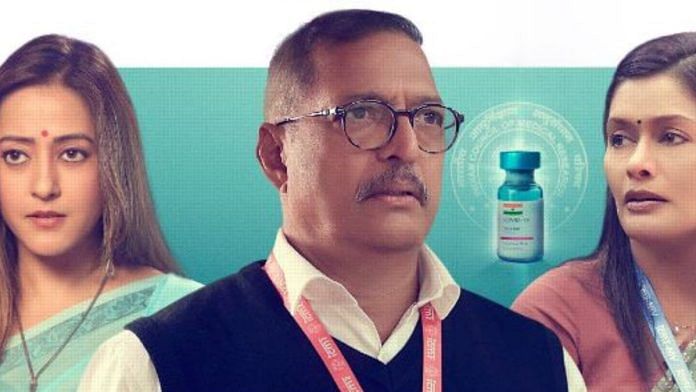Vivek Ranjan Agnihotri’s The Vaccine War could have been a story about India’s unsung Covid heroes — the scientists, particularly the women, who led the country’s fight to develop indigenous vaccines. But the writing is so focused on ‘villains’ that it keeps forgetting heroes. Based on former ICMR director Dr Balram Bhargava’s book, Going Viral: Making Covaxin, the film, which tries to delve into the often overlooked journey of India’s scientific community, ends up suffering from Agnihotri’s own political agenda.
Marketed as India’s ‘first bio-science film’, The Vaccine War becomes preoccupied with blame, China, Indian media, and the opposition while almost forgetting its own heroes, the scientists.
In The Vaccine War, the journalistic community makes for the main antagonist. In an extremely unidimensional representation of Indian media, it is insinuated through Raima Sen’s character Rohini Dhuliya that any question raised about the efficacy or credibility of the vaccine can only be made by an “enemy of the country”. In the last press conference shown in the film, Bhargava (played by Nana Patekar) calls Rohini, the science editor of a prominent daily, “a terrorist”.
In a crucial moment, the head of the Pune-based National Institute of Virology, Priya Abraham (Pallavi Joshi), labels details circulated by the media as “information war”. Agnihotri’s portrayal is laced with malice, a repeat of the approach he took toward The Kashmir Files (2022).
It undermines Indian journalists’ tireless reporting, which brought to light valuable information about vaccine trials as well as their efficacy and setbacks. The headlines shown in Agnihotri’s film, such as “India Can’t Do It”, are almost ludicrous, as no real news editor worth their salt would ever approve of them.
Both Radhika Menon of The Kashmir Files and Rohini Dhuliya of The Vaccine War become near-comic villains because of the wild exaggeration in writing. While in The Kashmir Files, Menon’s character dismisses the exodus of Kashmiri Pandits as a sham, in The Vaccine War, Rohini trades photos of second wave Covid deaths in India for dollars. She distributes foreign vaccine toolkits among celebrities and politicians and is backed by the US pharmaceutical lobby.
There is no doubt that there are unscrupulous people in every profession, and journalism is not above it. But Agnihotri’s decision to make Rohini the very symbol of Indian journalism in his film takes away from its credibility. Through her, he suggests that any questioning of the government is akin to targeting its might and ‘atmanirbharta’. It resembles his stilted portrayal of Jawaharlal Nehru University (JNU) in The Kashmir Files. What began with the sedition case of 2016, the arrest of Umar Khalid, pejoratives like ‘tukde-tukde gang’ and the alleged attack on JNU students by Akhil Bharatiya Vidyarthi Parishad (ABVP) members in 2019 was tied neatly in Agnihotri’s cinematic misrepresentation of the university. Menon’s character was born out of Agnihotri’s labelling of certain liberals as ‘urban naxals’.
Also read:
Agnihotri’s portrayal forgets scientists
The film conveniently glosses over the plight of doctors, offering the simplistic view that one vaccine solved all of the administrative problems India suffered during the Covid crisis. From the migrant exodus and the breakdown of India’s public health system to the oxygen cylinder crisis during the second wave, ground realities are explained and wished away, blamed solely on vaccine hesitancy fuelled by Indian media.
In a press conference in The Vaccine War, scientists blame the Delhi government and opposition leaders for the pandemic—everyone except the Centre. One scientist goes on to spell out that in her long career, she finally feels supported because the government approves of vaccine manufacturing. Does that actually not speak of the sorry state of medical infrastructure in India? Agnihotri clearly missed the memo on irony.
The most ironic moment, perhaps, is when Rohini’s unnamed housekeeper asks her why journalists focus on deaths in India when people are dying in Italy and the US, too. According to her, reporting on mass deaths and funeral pyres harms the dignity of the dead and affects their families. Aginhotri should revisit the scene to understand how he robbed the brilliant scientists, many of them women, of their dignity, through this film.
(Edited by Zoya Bhatti)



